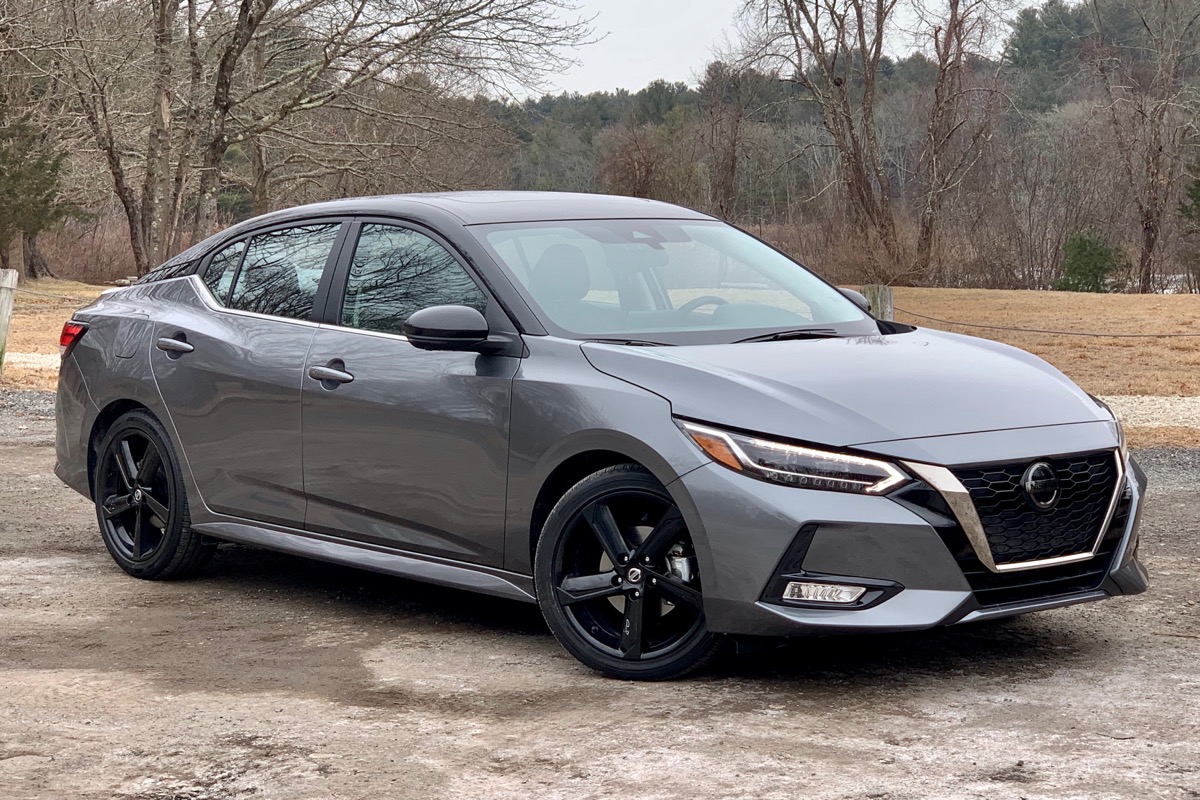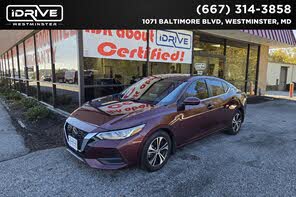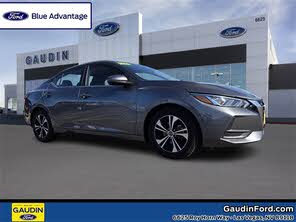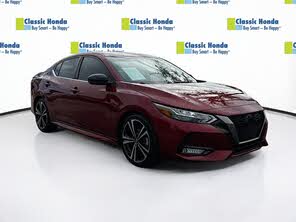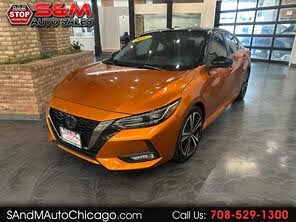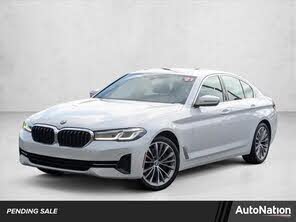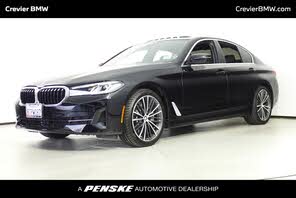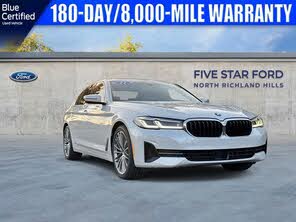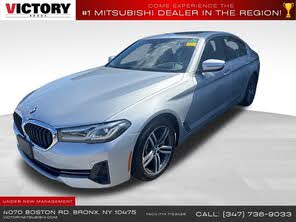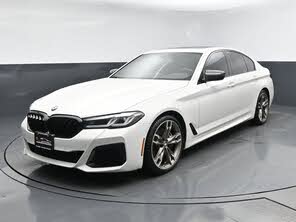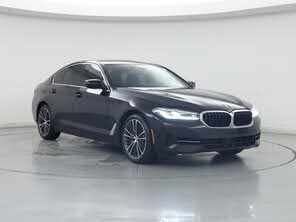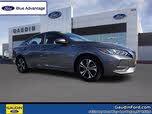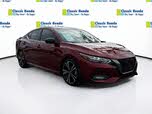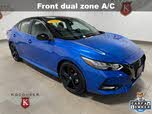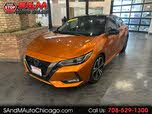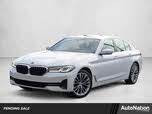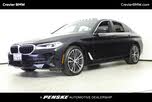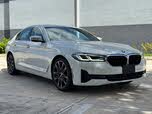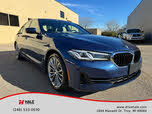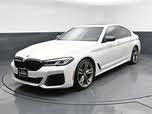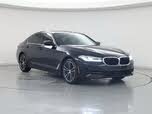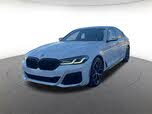2022 Nissan Sentra vs 2021 BMW 5 Series
Overview | |
MSRP$54,200 | MSRP$19,950 |
Listings295 | Listings1399 |
Ratings & Reviews | |
User Reviews | User Reviews |
Expert reviews8.0 out of 10 | Expert reviews7.7 out of 10 |
Pros
Cons
| Pros
Cons
|
2021 BMW 5 Series Reviews SummaryBMW was once known for sports sedans, and the 5 Series was one of the most prolific of those sedans. Sitting between the 3 Series and 7 Series in size and price, previous generations of 5 Series were known for a balance of performance and luxury, with impeccable engineering throughout. Today, the BMW 5 Series is largely irrelevant. The 3 Series is now so big that there is less reason to upgrade, and most buyers are more interested in SUVs anyway. The competition—including the Audi A6, Jaguar XF, Mercedes-Benz E-Class, and Volvo S90—has also gotten better. That doesn’t mean BMW has given up on the 5 Series. The current generation (codename G30) arrived for the 2017 model year, but it gets a midcycle refresh (or LCI, short for “Life Cycle Impulse,” in BMW speak) for 2021. Major updates include a 48-volt mild-hybrid system, a bigger infotainment touchscreen, and subtle styling changes. The 2021 BMW 5 Series is not like the 5 Series models of old. That may drive away hardcore car fans, but the 2021 model makes a strong case to new-car buyers, maintaining sportier-than-average driving dynamics, along with the tech and luxury features expected of a car in this segment. | |
2022 Nissan Sentra Reviews SummaryA lot is asked of small sedans. It’s not just that they are expected to be competent, affordable machines that can accommodate a buyer on a budget. For the automaker, the small sedan is also the intended entry point for the brand. This is the car that is supposed to convince shoppers to keep buying from them as they move into different vehicles. The 2022 Nissan Sentra is the perfect entry point for Nissan, but it wasn’t always this way. The 2022 Sentra is two years removed from a significant 2020-model-year redesign. With such a focus on small crossovers and tight competition in the small-car segment, such a redesign sometimes gets lost in the shuffle of new vehicle debuts. So two years into its new generation, how is the Sentra doing? And how does it stack up with a very competitive collection of new small sedans? Read on to find out. | |
No video found | |
Popular Features & Specs | |
Engine2.0L 248 hp I4 | Engine2.0L 149 hp I4 |
Drive TrainRWD | Drive TrainFWD |
Seating Capacity5 | Seating Capacity5 |
Horsepower248 hp @ 5200 rpm | Horsepower149 hp @ 6000 rpm |
MPG City25 | MPG City29 |
MPG Highway33 | MPG Highway39 |
Engine | |
Engine Name2.0L 248 hp I4 | Engine Name2.0L 149 hp I4 |
Torque257 lb-ft @ 1500 rpm | Torque146 lb-ft @ 4000 rpm |
Horsepower248 hp @ 5200 rpm | Horsepower149 hp @ 6000 rpm |
DrivetrainRWD | DrivetrainFWD |
Fuel Economy | |
MPG City25 | MPG City29 |
MPG Highway33 | MPG Highway39 |
Interior | |
Seating Capacity5 | Seating Capacity5 |
Key Features | |
Navigation SystemStandard | Navigation System |
Sunroof/MoonroofStandard | Sunroof/Moonroof |
Safety | |
Front Crash Overall | Front Crash Overall4 |
Side Crash Overall | Side Crash Overall5 |
Dimensions & Capacity | |
Cargo Space14.0 cu ft | Cargo Space14.3 cu ft |
Curb Weight3765 lbs | Curb Weight3036 lbs |
Height58.2 in | Height56.9 in |
Length195.8 in | Length182.7 in |
Width83.7 in | Width71.5 in |
Wheelbase117.1 in | Wheelbase106.6 in |
Maximum Payload800 lbs | Maximum Payload921 lbs |
Number of doors4 | Number of doors4 |
Overview | ||
MSRP | $54,200 | $19,950 |
Listings | ||
Ratings & Reviews | ||
User reviews | ||
Expert reviews | 8.0 out of 10Read full review | 7.7 out of 10Read full review |
Pros & cons | Pros
Cons
| Pros
Cons
|
Summary | BMW was once known for sports sedans, and the 5 Series was one of the most prolific of those sedans. Sitting between the 3 Series and 7 Series in size and price, previous generations of 5 Series were known for a balance of performance and luxury, with impeccable engineering throughout. Today, the BMW 5 Series is largely irrelevant. The 3 Series is now so big that there is less reason to upgrade, and most buyers are more interested in SUVs anyway. The competition—including the Audi A6, Jaguar XF, Mercedes-Benz E-Class, and Volvo S90—has also gotten better. That doesn’t mean BMW has given up on the 5 Series. The current generation (codename G30) arrived for the 2017 model year, but it gets a midcycle refresh (or LCI, short for “Life Cycle Impulse,” in BMW speak) for 2021. Major updates include a 48-volt mild-hybrid system, a bigger infotainment touchscreen, and subtle styling changes. The 2021 BMW 5 Series is not like the 5 Series models of old. That may drive away hardcore car fans, but the 2021 model makes a strong case to new-car buyers, maintaining sportier-than-average driving dynamics, along with the tech and luxury features expected of a car in this segment. | A lot is asked of small sedans. It’s not just that they are expected to be competent, affordable machines that can accommodate a buyer on a budget. For the automaker, the small sedan is also the intended entry point for the brand. This is the car that is supposed to convince shoppers to keep buying from them as they move into different vehicles. The 2022 Nissan Sentra is the perfect entry point for Nissan, but it wasn’t always this way. The 2022 Sentra is two years removed from a significant 2020-model-year redesign. With such a focus on small crossovers and tight competition in the small-car segment, such a redesign sometimes gets lost in the shuffle of new vehicle debuts. So two years into its new generation, how is the Sentra doing? And how does it stack up with a very competitive collection of new small sedans? Read on to find out. |
Video | No video found | |
Popular Features & Specs | ||
Engine | 2.0L 248 hp I4 | 2.0L 149 hp I4 |
Drive Train | RWD | FWD |
Seating Capacity | 5 | 5 |
Horsepower | 248 hp @ 5200 rpm | 149 hp @ 6000 rpm |
MPG City | 25 | 29 |
MPG Highway | 33 | 39 |
Engine | ||
Engine Name | 2.0L 248 hp I4 | 2.0L 149 hp I4 |
Torque | 257 lb-ft @ 1500 rpm | 146 lb-ft @ 4000 rpm |
Horsepower | 248 hp @ 5200 rpm | 149 hp @ 6000 rpm |
Drivetrain | RWD | FWD |
Fuel Economy | ||
MPG City | 25 | 29 |
MPG Highway | 33 | 39 |
Interior | ||
Seating Capacity | 5 | 5 |
Key Features | ||
Navigation System | Standard | |
Sunroof/Moonroof | Standard | |
Safety | ||
Front Crash Overall | 4 | |
Side Crash Overall | 5 | |
Dimensions & Capacity | ||
Cargo Space | 14.0 cu ft | 14.3 cu ft |
Curb Weight | 3765 lbs | 3036 lbs |
Height | 58.2 in | 56.9 in |
Length | 195.8 in | 182.7 in |
Width | 83.7 in | 71.5 in |
Wheelbase | 117.1 in | 106.6 in |
Maximum Payload | 800 lbs | 921 lbs |
Number of doors | 4 | 4 |
The 2021 BMW 5 Series had a restrained design, lacking the flourishes of the 3 Series and the imposing size of the 7 Series. It received a minor styling refresh, featuring sleeker LED headlights and a larger twin-kidney grille. The car also had trapezoidal tailpipes, L-shaped taillights, and new bumpers for the M Sport Package. The interior maintained the familiar BMW layout, with specific design elements like the touchscreen positioning and the shifter typeface. Lower trims had SensaTec upholstery, while higher trims offered Dakota and Nappa leather. The aluminum trim added a high-end feel, but the sport steering wheel felt out of place.
The 2022 Nissan Sentra carried over its 2020 redesign, resembling a downsized Altima with a low-slung, modern look. The interior was a highlight, featuring a simple yet functional layout with easy-to-use controls and a touchscreen as the visual centerpiece. The Sentra came in various trims—S, SV, and SR—each adding more features like alloy wheels, heated mirrors, and premium upholstery. The SR trim included sport cloth seats with orange stitching and a leather-wrapped shift knob. The Midnight Edition package added dark accents and unique badging, enhancing the car's aesthetic appeal.
















The 2021 BMW 5 Series offered multiple powertrain options. The base 530i had a 2.0-liter turbocharged four-cylinder engine with 248 horsepower and 258 pound-feet of torque, achieving 0-60 mph in 5.9 seconds. The 540i featured a 3.0-liter turbocharged inline-six engine with a 48-volt mild hybrid system, producing 335 hp and 362 lb-ft of torque, and reaching 0-60 mph in 4.9 seconds. The M550i xDrive had a 4.4-liter twin-turbo V8 with 532 hp, while the M5 boasted 617 hp, achieving 0-60 mph in 3.1 seconds. The 530e plug-in hybrid combined a 2.0-liter engine with an electric motor, offering 288 hp and a 0-60 mph time of 5.7 seconds.
The 2022 Nissan Sentra featured a 2.0-liter four-cylinder engine with 149 horsepower and 146 pound-feet of torque, paired with a continuously variable transmission (CVT) and front-wheel drive. The engine provided solid low-end acceleration and satisfactory highway performance. The Sentra's steering was well-weighted, and its suspension handled most road conditions well, making it suitable for commuting and road trips. The Sport button on the shifter offered minimal performance improvement, but the base setup was consistent in both city and highway driving.
The 2021 BMW 5 Series was available as a four-door, five-seat sedan in the U.S. It offered spacious front seats and adequate rear-seat room. The trunk had 14.0 cubic feet of space, with a 40/20/20 split-fold rear bench for longer items. The test car featured 16-way power front seats with heating and ventilation, but forward visibility was poor due to the long hood. A surround-view camera system helped with parking.
The 2022 Nissan Sentra provided 14.3 cubic feet of trunk space, expandable with a 60/40 split-fold rear bench. The trunk could be remotely opened via the key fob or a dashboard button. The Sentra had spacious front seats with ample headroom and legroom, while the rear seats offered decent legroom and headroom. The front row included large in-door cargo trays and bottle holders, with plenty of cupholders and trays in the center console.
The 2021 BMW 5 Series came with a standard 12.3-inch infotainment touchscreen and a 12.3-inch digital instrument cluster. It included Apple CarPlay/Android Auto, Bluetooth, SiriusXM 360L, and a WiFi hotspot. The rotary knob controller provided a tactile feel, and voice control responded to "Hey BMW." Gesture controls were available but less precise than traditional volume knobs.
The 2022 Nissan Sentra featured a 7-inch touchscreen with Apple CarPlay and Android Auto, while the SV and SR trims had an 8-inch touchscreen. The system included conventional hard buttons and volume/tuning dials. The graphics could use updating, and wireless Apple CarPlay/Android Auto were not available, unlike some competitors.
The 2021 BMW 5 Series had not been crash-tested by the IIHS for 2021, but the 2020 model received a "Top Safety Pick+" award. Standard safety features included lane-departure warning, automatic emergency braking, blind-spot monitoring, and automatic high beams. The Driving Assistance Plus Package added adaptive cruise control, traffic-jam assist, and lane-keep assist. The adaptive cruise control provided smooth operation, especially in stop-and-go traffic.
The 2022 Nissan Sentra came with standard driver-assistance features like forward and reverse automatic emergency braking, forward collision avoidance, pedestrian detection, driver drowsiness monitoring, lane-departure warning, and blind spot monitoring. Additional features included a surround-view parking monitor and adaptive cruise control. The Sentra earned a five-star overall rating from the NHTSA and a "Top Safety Pick" award from the IIHS, with high ratings for crash tests and driver-assistance features.
CarGurus highlights

According to CarGurus experts, the overall rating for the 2021 BMW 5 Series is 8.0 out of 10, while the 2022 Nissan Sentra scores 7.7 out of 10. Based on these ratings, the 2021 BMW 5 Series is the recommended choice for its superior performance, luxury features, and advanced technology.
Choose the 2022 Nissan Sentra if:
- You want a budget-friendly car with solid standard safety features.
- You need a spacious trunk and comfortable seating for daily commuting.
- You prefer a user-friendly infotainment system with physical buttons.
Choose the 2021 BMW 5 Series if:
- You prioritize a wide range of powerful engine options.
- You value a high-end interior with customizable leather options.
- You seek advanced driver-assistance features with smooth operation.
CarGurus highlights

According to CarGurus experts, the overall rating for the 2021 BMW 5 Series is 8.0 out of 10, while the 2022 Nissan Sentra scores 7.7 out of 10. Based on these ratings, the 2021 BMW 5 Series is the recommended choice for its superior performance, luxury features, and advanced technology.
Choose the 2022 Nissan Sentra if:
Shop Now- You want a budget-friendly car with solid standard safety features.
- You need a spacious trunk and comfortable seating for daily commuting.
- You prefer a user-friendly infotainment system with physical buttons.
Choose the 2021 BMW 5 Series if:
Shop Now- You prioritize a wide range of powerful engine options.
- You value a high-end interior with customizable leather options.
- You seek advanced driver-assistance features with smooth operation.

By: CarGurus + AI
At CarGurus, our team of experienced automotive writers remain at the heart of our content operation, conducting hands-on car tests and writing insightful guides that are backed by years of industry experience. To complement this, we are harnessing AI to make our content offering more diverse and more helpful to shoppers than ever. To achieve this, our AI systems are based exclusively on CarGurus content, ratings and data, so that what we produce is both unique to CarGurus, and uniquely helpful to car shoppers.
